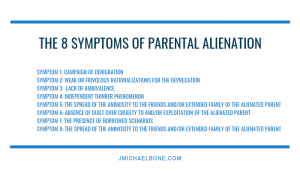Illinois Divorce: Parental Alienation as Child Abuse
Illinois Divorce: Divorcing the Narcissist
My divorce and post decree clients that have people with traits of toxic narcissism often struggle with trying to explain or discuss what it can be like living with someone with such toxic traits, especially when the person is able to maintain a facade of normalcy on their work or neighborhood relationships. Sometimes, I have to coach clients to understand that it can be difficult persuading others as to how emotionally damaging these relationships are, especially when the narcissist is “high functioning,” or otherwise able to disguise their abusive behaviors from the rest of the world. Living with someone with a toxic narcissistic personality disorder can be brutal, especially when the narcissist uses the relationship to emotionally abuse their partner, and tries to turn children, neighbors, and even family members against the otherwise healthy partner.

Signs and symptoms of narcissistic personality disorder and the severity of symptoms vary. People with the disorder can:
- Have an exaggerated sense of self-importance
From Dr. Michael Bone: Expert on Parental Alienation

Parental Alienation in Narcissistic Relationships
This is a particularly good article that was sent by a past client of our Firm. I am fortunate that many of my current and past clients stay engaged with the literature and groups that deal with Parental Alienation, to the point that they wish to share the benefits and knowledge of what they may have acquired as we worked on their case, and the client witnessed for themselves the identification of these alienation scenarios and the strategies that I have developed (with the benefit of the insights of many great clinicians, authors and PA experts through the years).
This article is quite good and focuses on an important issue for today: Why We Persevere and Stay on Course for the Child Victims of Parental Alienation. These children are being harmed by the PA. Most love their targeted parent, but have been coerced and brainwashed to reject the loving parent. This sentence, from Dr. Stines’ essay, captures the point: It is much easier to reject someone you know will never leave, than it is to reject someone you can barely hold on to.
Strategy, Perseverance, Patience. Three of my many keys to managing these cases.
DuPage Divorce: Is Child Custody Different with Divorce and Parentage?
Questions come up from time to time about how parents are treated in Parentage cases ( where the parents are unmarried) vs. in a divorce case. Should fathers for example, be treated differently in a child custody case if they are not married to the mother of the child or children? The answer in Illinois, fortunately, is no. The Illinois Parentage Act borrows and connects with the Illinois Marriage and Dissolution of Marriage Act (IMDMA) and utilizes in Parentage cases the same child custody statutes that are used in divorce cases. These days, parents are no longer awarded “custody,” but are awarded “allocations of parenting time.”
In a New Jersey case, the Parentage courts were expected to decide child custody issues in a speedy fashion, and it seems that this expedited approach robbed some fathers of the right to have a full hearing over child custody issues. A recent case there made the news, as the appellate court decided that the rules for parentage cases should follow the same rules and due process afforded in a divorce case. Here’s a summary of that case for those interested in the details:

Illinois Divorce: Parental Alienation and Strategies

 Illinois Divorce Lawyer Blog
Illinois Divorce Lawyer Blog

